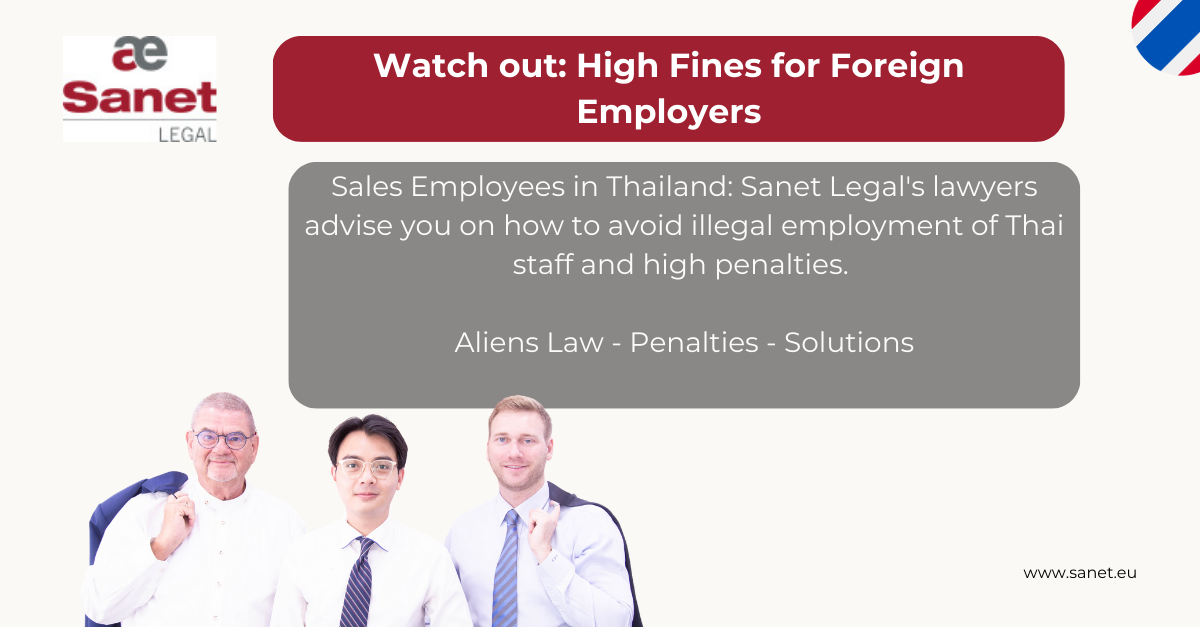Having their own employees in Thailand seems to be the cheap and direct way to sales and service in Thailand for many foreign companies. But beware: The law prohibits foreigners from selling their products or even providing consulting or technical services through by themselves or through Thai employees. There is the risk of imprisonment, fines of up to USD15,000 per day and corporate tax for both business owners and employees.
The Thai Foreign Business Act protects Thai traders and marketers from foreign competition. Those who use their own employees to sell their products or services in Thailand turn them into an (illegal) permanent establishment. Draconian penalties are imposed for violating or circumventing the law. This also includes employing sales or service staff through personnel service providers or law firms. Often, the latter themselves are unaware of the risks they expose themselves and their clients through a “payroll” or “staffing service” ” for illegal activities of foreign customers.
Just because breaking the law works well for a while doesn’t mean it will become legal. Well, you can also cheat the tax office for a while. But when fraud comes out, the law doesn’t show any mercy. Ignorance does not protect from punishment.
And it usually does come out, even if sometimes only after years: At some point, an employee, a competitor, a business partner or perhaps even a personal acquaintance gets annoyed with someone involved. Anonymous “Whistle Blowing” hotlines of the authorities are then happy to receive valuable information.
The legal picture
In many countries, it is permissible to hire sales or service personnel directly or through a staffing agency in order to save an admin intensive company formation or a distribution contract with a local distributor or marketer.
Not so in Thailand. The Foreign Business Act forbids foreigners from offering “wholesale and retail” or consulting services.
A foreigner is defined as any foreign company or individual (including Thai individuals) working for a foreign company. “Wholesale and retail” in this context are any sales activities, from pre-sales to closing to processing and even just the related technical advice or service.
Those foreigners are not allowed to hire staff in Thailand and through them to engage in trading or consulting activities. This is particularly true for foreigners who have their staff formally employed by a staffing service, a tax consultant or a law firm.
These “bogus employers” earn well, and their risk is low. They can argue that they didn’t know what these employees were actually doing.
The “”fool” is mostly only the foreign client and – unfortunately – also the Thai employee. Both face legal liability and criminal penalties
The ban even applies to sales representatives who work for the foreigner on a commission basis, which is why you hardly ever come across them in Thailand.
Penalties and consequences
The Managing Director of the foreign company and their Thai Employees are then accused of arranging to enable a foreigner to carry out prohibited sales and service activities in Thailand.
Up to 600,000 THB (approx. 17,000 USD) is the penalty for each day that this circumvention is carried out. Furthermore, there is the threat of imprisonment and additional fines for both, the foreign Manager, and the local employees. Thus, the “silver eight” can click fast with the next entry.
From a tax point of view, the employee “formally” salaried in Thailand in such a manner is considered to be an (illegal) branch office and thus also a permanent establishment for tax purposes.
All sales of the foreigner to Thailand – even if normally invoiced from abroad – are then subject to Thai corporate income tax. This may also apply to the Thai employee, since he or she personally represents the branch office. It goes without saying that the illegal “branch office” will then be dissolved after all. The business with Thailand is thus terminated.
How to recognize “bogus employment”?
When you ask them about the risks, the providers of these staffing services wave them off. What they are doing is all right, they reassure. After all, the employee would not be formally employed directly by the foreigner.
Yet, one or more of following characteristics are usually enough to recognize whether an employment is to be considered as illegal circumvention of the Foreign Business Act. The rule is that even a single characteristic can be sufficient to assume that the law is being circumvented. Yet the more of these characteristics are fulfilled, the more certain it becomes for the assumption that this is the case:
- The formal employer calls itself in the service or employment contract a “staffing service provider,” “recruitment service,” or he provides a “payroll service.”
- The formal employer has staffing services as the Company Objectives in his Articles of Association, but not, for example, “trading, import, export, technical services” or the like, which would explain and justify the activities of the employees.
- The authorities will then inquire what a “staffing agency”, a law firm or an accounting firm is “up to” with, for example, the sale of machinery or medical devices.
- If the employee’s activity is “atypical” for the employer’s business objective, the illegal circumvention of the law The illegality appears probable.
- If the employer’s place of business is not also the place of work of the employees, the circumvention lies close. If the foreign company even rents business premises where the employees are located away from the formal employer, the case of circumvention is seems clear as day.
- Does the “Foreigner” take over the disciplinary leadership of the employee, for example, the monitoring of sales activities, reporting and travel expenses, and does he give direct instructions to the employee, it all argues for an illegal circumvention of the law. The foreigner is the beneficial employer. The criminal circumvention is most probable.
- If the foreigner is entitled to give professional instructions to the employee, then he too is the beneficial employer. Only if instructions go through the Thai employer, for example an authorized dealer, or via an interface designated by the latter, does this not lead to the conclusion that the law has been circumvented.
- If the duration of the employee’s employment is linked directly to the service contract of the “bogus employer”, this points to a punishable circumvention contract as well.
- Watch out for the job descriptions. They must come from the “formal employer”. Yet, doing so, he would admit that he is engaging in activities outside his company objectives. If the job descriptions are made by the foreigner, this is another indication of his role as the beneficial employer.
All in all, it should be noted that a foreigner can hardly plead that he was not aware of his illegal situation. Anyone who acts in this way and gets involved in such “constructs” knows what he is doing. Thailand is a constitutional state. Those who believe they can “trick” the authorities will find out sooner or later.

Your own employee in Thailand is bound by strict legal rules. How to do it right.
Things can also be done legally!
If you want to trade and service legally in Thailand, the country offers a number of options:
- The Thai “Board of Investment” (BOI) promotes numerous activities, among others, by granting permission to engage in wholesale trade or, for example, to sell certain components directly to, the automotive industry.
- The Trade and Investment Office (TISO) allows machine builders to whole sale and directly sell technical services.
- The International Business Center (IBC) allows in-house services such as market research and digital services, and subsequently the wholesale of products for affiliated companies.
- The International Procurement Office (IPO) permits distribution and inventory management for even multiple suppliers.
- The government can issue a Foreign Business License (FBL) upon application.
- A wisely structured Joint Venture with a Thai company removes all restrictions and makes the foreigner a “Thai” company.
- An importer, distributor or marketer agreement with a Thai company as a partner offers tiered contractual services. This goes from the full service of a contract distributor like the machinery dealer Krasstech to other reputable partners offering variable and demand-oriented distribution services like DKSH, Sanet Trade & Services or Melchers with best reputation over now decades. With most of them, it is also negotiable that they assign one or more competent employees also exclusively for your products.
Sanet Legal, Thailand’s German-speaking corporate lawyers, will be happy to advise you on your customized market entry in Thailand.

